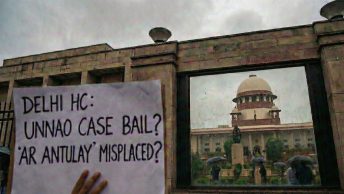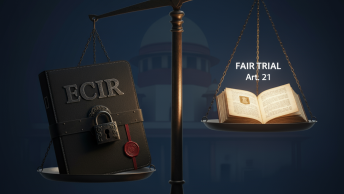Continuing from the discussion in Part I, the Verdict highlights the Indian legal system’s failure to devise and implement strategies outside of carceral punishment (particularly workplace discrimination law) for preventing and redressing sexual violence. Regardless of whether Tejpal the individual is found guilty, Tehelka’s failure as an institution to address an alleged threat to workplace safety is writ large on the facts of the case.
It’s not as if the accusation against Tejpal was an exception to an otherwise spotless character profile. The prosecutrix testified that he habitually made sexually colored remarks to female employees at the workplace, and that he prioritized sexual banter over giving her constructive professional feedback. However, managing editor Shoma Chaudhary advised employees to treat it as a “joke”. Tejpal’s former employer has recorded that he was known to use his official position to seek “non-consensual carnal favours” from interns and juniors, though no formal complaints were filed. Therefore, the allegations made by the prosecutrix must be evaluated against the backdrop of an existing culture of institutional sexual harassment which had gone unaddressed by its senior management. This is something that the Verdict has clearly failed to do.
It is also pertinent to note that the prosecutrix’s first response after the incident was not to file a police complaint but to seek an institutional inquiry against Tejpal. Her colleagues also insisted that a committee be constituted under the Vishakha guidelines. However, this was allegedly dismissed by Chaudhary because the accused had not contested the prosecutrix’s version of events at that point. Instead, the matter was indirectly settled through the use of a formal apology circulated by the accused to the Tehelka staff.
The “public apology” is a common tactic adopted by several sexual harassment accused especially post #MeToo. This is the modern version of the “compromise” which saves the survivor from the trauma inflicted by the criminal process/bureaucratic workplace inquiry but also ensures that the accused does not have to face formal accountability. There is no sanction or prescribed mechanism for recording such apologies, as these are not even the result of a formal conciliation procedure under the Vishakha guidelines or the Sexual Harassment of Women at Workplace (Prevention, Prohibition and Redressal) Act, 2013. The Verdict treats Tejpal’s apology as evidence that the prosecutrix arm-twisted the management to procure a false confession from Tejpal, rather than an admission of guilt on his part. Thus, the lack of legal relevance assigned to public apologies is likely to create problems for any assault victims who change their mind about pursuing legal proceedings subsequent to accepting such apologies.
Subsequent to the publicization of the case, Chaudhary admitted that Tehelka did not even have a committee as mandated under the Vishakha guidelines. When Tehelka did nominate an external person – Urvashi Butalia – to inquire into the case, she withdrew as “due process under the law had begun” (i.e. the police had taken cognizance) and hence the inquiry seemed “redundant”. Interestingly, even in the Vishakha case, the Supreme Court did not devote much attention to compensating Bhanwari Devi-whose rape was the genesis of the litigation-as the violence inflicted on her was the subject of a separate criminal action. Therefore, once the criminal process is initiated, the lapses on part of the employer (the State in Bhanwari Devi’s case, and Tehelka in the Verdict) are no longer considered relevant. However, the criminal trial, with its requirement of “beyond reasonable doubt” strips the victim of the agency to articulate her trauma on her own terms and requires her to adopt the conventions of the adversarial system instead [1]. The prevalence of sexual exploitation at workplaces like Tehelka becomes what Baxi refers to as a “public secret”-that which everyone knows, but cannot be articulated.
The Verdict therefore not only points to the failure of rape law reforms to reduce the prevalence of rape myths and reinvent traumatizing court procedures. It also showcases the failure of sexual harassment law to enforce liability against negligent employers. Even though the law does not mandate that civil and criminal remedies should be mutually exclusive, criminal action is perceived as foreclosing other remedies. Moreover, there is no option for victims to seek damages from private employers for not taking appropriate steps to address sexual harassment complaints. This even though the Supreme Court has acknowledged the availability of this remedy in the public sector context, regardless of whether the victim succeeds in her individual claim.
Perhaps the sequence of events that led to the Verdict may not repeat themselves if the State/workplaces were to implement formalized restorative justice systems. These would avoid the need for adversarial trials which re-traumatize the victim. The presence of trained mediators would ensure that any acceptance of guilt, or settlement between the victim and the accused, is formulated on the victim’s terms, in a safe space. Further, such admissions can be supported by other actions that signify accountability (e.g. a legally enforceable commitment to step down from positions of authority for a fixed period of time, engage in community service, etc.) However, adopting this system requires a larger conversation about whether we wish to de-link sexual abuse from popular notions of brutality and criminality, and accordingly re-orient solutions for the same.
References
- Pratiksha Baxi, Public Secrets of Law: Rape Trials in India, 138 (Oxford University Press, 2014).
Ms. Megha Hemant Mehta (she/her) is a graduate of the Batch of 2019, NLSIU, Bangalore, and a former judicial clerk at the Chambers of (Late) Hon’ble Mr. Justice M.M. Shantanagoudar, Supreme Court of India. Her areas of interest include anti-discrimination law, gender and sexuality law, and education policy. She can be reached at meghamehta8488@gmail.com.






